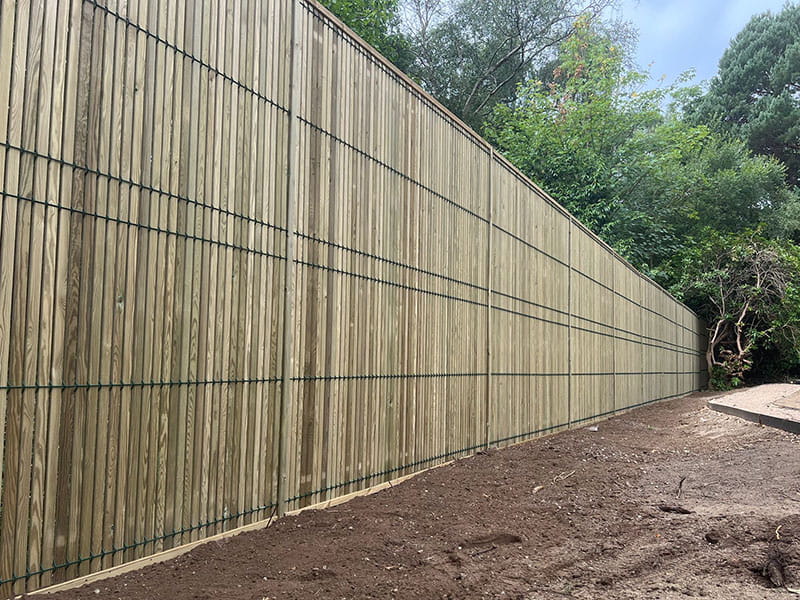16/06/2025 12:00 AM
When it comes to protecting your home, the right fencing can make a significant difference.
In this blog, we answer some of the most common questions about secure garden fencing.
There are many factors which contribute to creating the best fencing for home security, including strength, height, visibility, and deterrence. Here are the top options:
1. Steel security fencing
Best for: High-security residential areas
Why: Very strong, hard to cut or climb, often has spiked or pointed tops. Has high visibility between pales. Often made of vertical pales which can’t be climbed.
Examples: Ornamental railings, Barbican Imperial

2. Timber fencing with secure design
Best for: Blending security with aesthetics and adding privacy
Why: A solid, vertical design reduces climbing aids, while heavy duty panels prevent breakthroughs
Features to add: Secure panel to post fixings, anti-climb toppings, and rails installed on the inside

3. Acoustic Fencing
Best for: Noise reduction with additional security benefits
Why: Solid, no hand or footholds, often used for both residential and commercial perimeter security. Increases privacy.
We suggest: Jakoustic Reflective or 12K Envirofence

4. Combination Fencing
Best for: Versatile security, aesthetic appeal, and privacy
Why: Combines materials like steel and timber for a layered approach - strong, durable, and more discreet than industrial options
Combinations – Vertical Tongue and Groove Effect with Metal Railing Topper or EuroGuard Combi in high risk areas

Key Fence Security Features to Look For:
- Strong fixings between panels and posts
- Use of timber or steel Mi-T metal fence posts instead of concrete
- Lockable gates with tamper-proof hinges
- No horizontal rails on the outside (to prevent climbing), vertical pales, double sided panels to ensure no rails
- Minimum height of 1.8–2 metres
- Anti-climb topping (pointed finials, trellis with thorny planting, security combs)
- Secure fixings and gates (locks, anti-lift hinges)
- Durability (galvanised steel or pressure-treated timber with long guarantees)
What Type of Fencing Is Most Secure?
Security isn’t just about height, it’s about construction. A secure fence should have:
- Few or no horizontal rails on the outside
- Vertical pales
- Strong fixings
- Resistance to tampering – hidden or secure fixings
- Solid foundations in the ground
- No gaps underneath the panel
Which fence panels are the strongest?
A strong boundary fence is hard to break through. Heavy duty fence panels are a great place to start when looking for strong fence panels. Heavy duty fence panels are strong within their design; typically made with thicker, pressure-treated timber or galvanised steel components, these panels feature solid framing and tightly fixed boards that resist warping, impact, and wind damage. The use of stainless steel fixings and additional bracing enhances structural integrity, while the dense build quality reduces weak points often found in standard fence panels. This makes heavy duty panels particularly suitable for high security or exposed environments where durability and long-term performance are essential.

Even the strongest fence panel can fail if it isn’t properly installed. A secure installation starts with using sturdy posts set deep into the ground with concrete foundations to ensure stability. Panels must be firmly fixed to the posts using high quality screws or brackets to prevent movement or detachment in strong winds or under pressure. It’s also essential to include a gravel board beneath the panel to lift it off the ground, reducing the risk of rot and prolonging the panel’s lifespan. Proper alignment and spacing are key to maintaining structural integrity across the fence line.
What Is the Best Way to Keep Trespassers Out?
Creating a strong boundary is the best deterrent to keep trespassers out. Adding a fence along the whole boundary will remove the option to casually stroll onto your property. Adding driveway and side gates will also secure access ways.
Gravel can also be used as a deterrent for trespassers and intruders. Gravel makes noise when walked upon, so if someone decides to trespass it makes it easier to detect them.
Thorny plants along the boundary also deter intruders due to the risk of injury caused by them. Adding climbing plants like roses or pyracantha can also provide an extra layer of deterrence without compromising on aesthetic value.
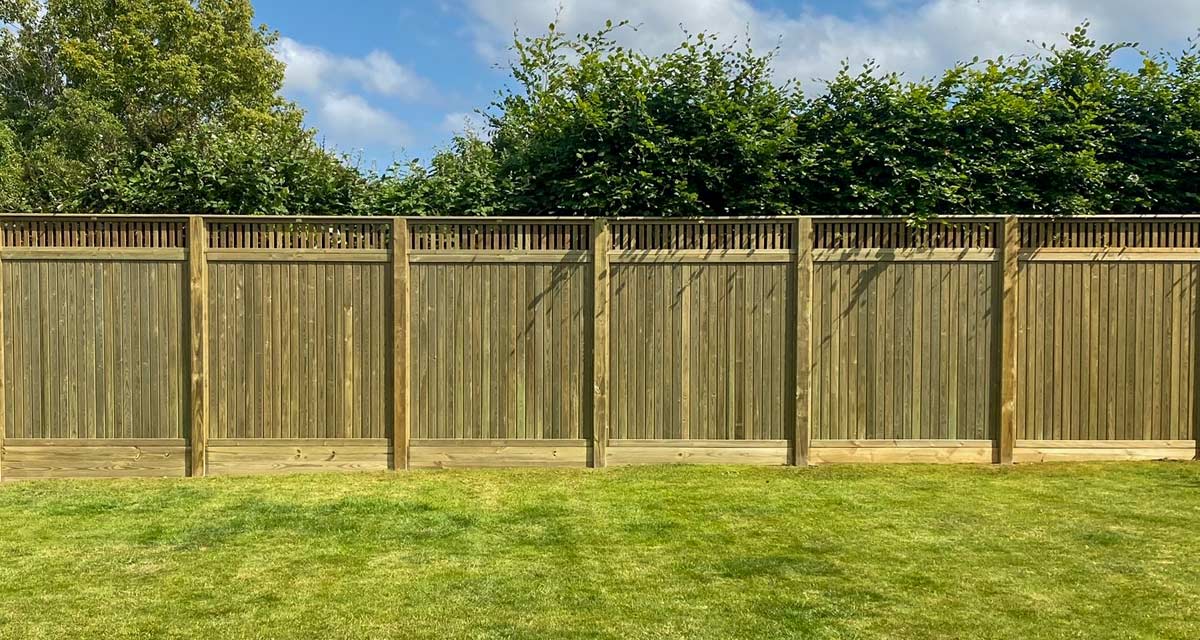
How to Secure a Fence from Burglars
Here are some key tips to increase the security of any fence:
- Install panels with rails on the inside to remove climbing aids.
- Fix panels securely using screws, fencing clips, or concealed panel-to-post connectors.
- Add anti-climb measures, such as security spikes or anti-climb paint (where appropriate and legal).
- Use secure gates with strong locks, which match the fencing.
- Keep fence lines clear of overgrown vegetation, which can provide cover for intruders.
How to Secure Fence Panels from Being Lifted
Fence panels that aren’t securely fixed in place can be easily lifted out, posing a serious security risk. Concrete slotted posts don’t offer a built-in method to fix panels securely, which means panels can be quietly removed, allowing unauthorised access to your property. In some cases, intruders may even replace the panel afterward, leaving no visible sign of entry making it difficult to detect that a breach has occurred. This lack of security highlights the importance of using a fencing system where panels are permanently fixed to the posts.
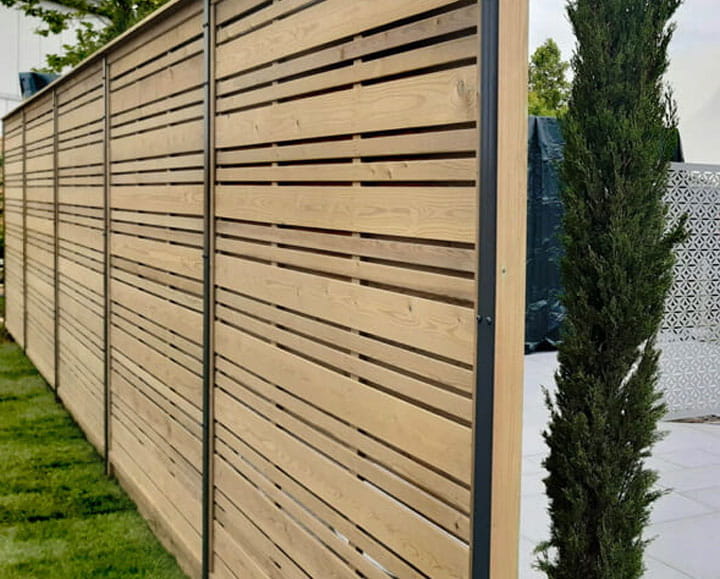
Using wooden posts prevents fence panels from being lifted out because the panels are securely screwed or fixed directly into the posts, creating a permanent and rigid connection. Fences built with timber posts offer a much higher level of security and peace of mind, particularly in areas where unauthorised access is a concern.
Best Garden Fencing for Security for Luxury Homes
Customer Project Overview
A row of luxury mansions in a prestigious corner of the UK needed a fencing solution that could deliver high levels of protection while complementing their carefully designed homes and landscaped gardens. The rear boundaries of the properties bordered directly onto a public woodland, which made privacy as well as security an important consideration. As the woodland became increasingly popular with walkers and dog owners, incidents of casual trespass and unauthorised access to the gardens began to rise. The homeowners needed an aesthetically pleasing garden fence panel that also offered a higher level of security. They needed to choose the best garden fencing to provide robust security, while remaining discreet and preserving the premium nature of the area.
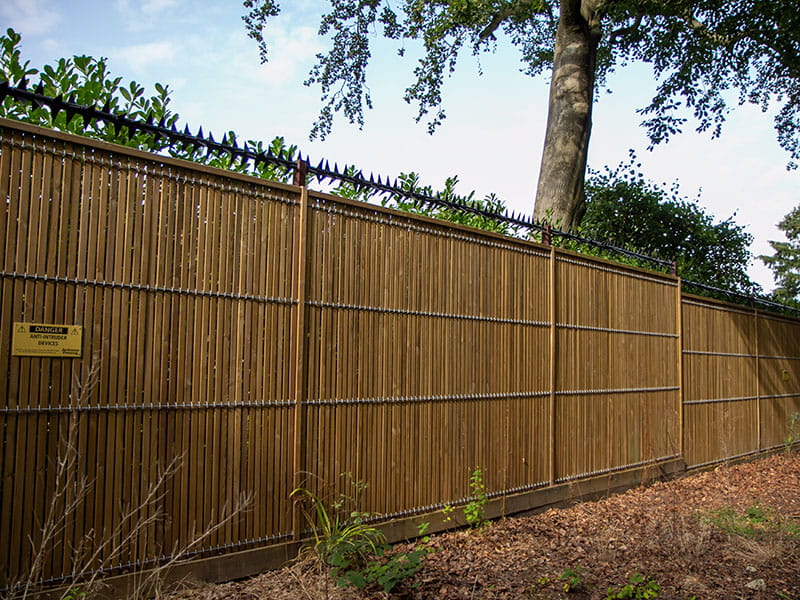
The Challenge of Garden Fencing for Security
The challenge was to provide effective home security fencing that deters intruders while maintaining a refined appearance that works in harmony with the setting. Full height walls or solid barriers could have offered security but would have closed off the gardens too harshly and made the homes feel more like fortresses than welcoming spaces.
A solution was required that could deliver the strength and privacy of a high security fence, but with a subtle design that blended seamlessly with the architecture and landscape. The best garden fencing for security in this context had to be strong, attractive, and versatile enough to complement multiple property styles.
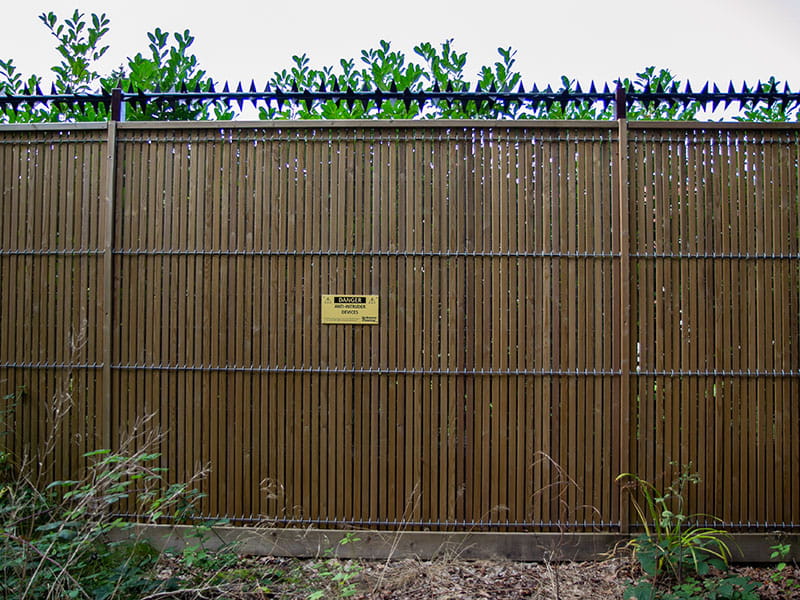
EuroGuard® Combi: The Best Garden Fencing for Security
EuroGuard® Combi fencing was chosen as the most suitable system for this application. It was installed by MacDonald Fencing, one of our Surrey based Approved Installers. Combining welded V mesh panels with timber slats, it strikes the perfect balance between strength and appearance. The steel mesh provides strength, while the timber adds warmth and softness, helping the fence blend with both the gardens and the woodland. This design ensures privacy as well as security, addressing the concern of properties backing directly onto a public space.
Importantly, EuroGuard Combi fencing is available in Secured by Design and LPS 1175 rated versions, which are often required by insurers and security consultants. This underlines why it is trusted for projects where premium protection is needed without compromising appearance.
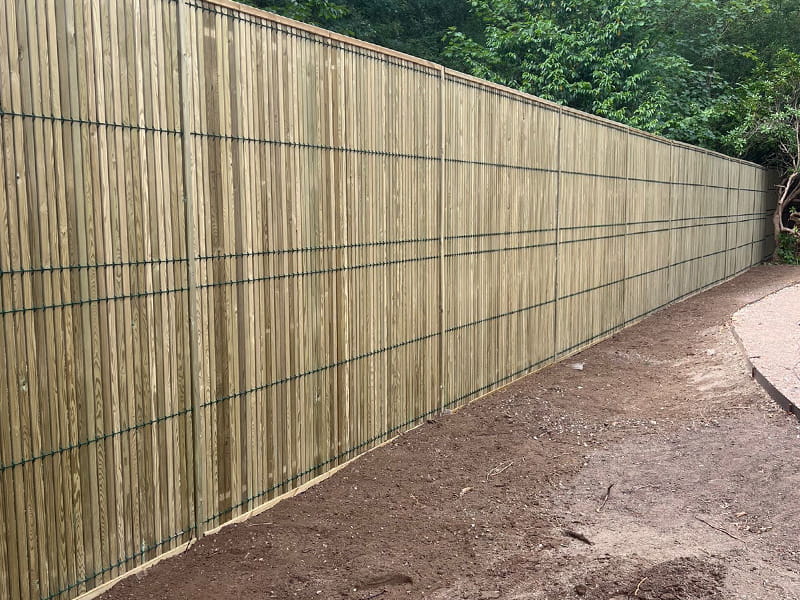
Enhancing Garden Security Without Compromise
Rota® Spike topping was added to sections of the fencing as a strong deterrent against climbing while still maintaining the uniform, elegant finish of the boundary.
Matching EuroGuard gates were also installed for both pedestrian and vehicle access. Designed in the same materials and style as the fencing, the gates created a consistent look across the development, ensuring that every access point matched the overall security solution.
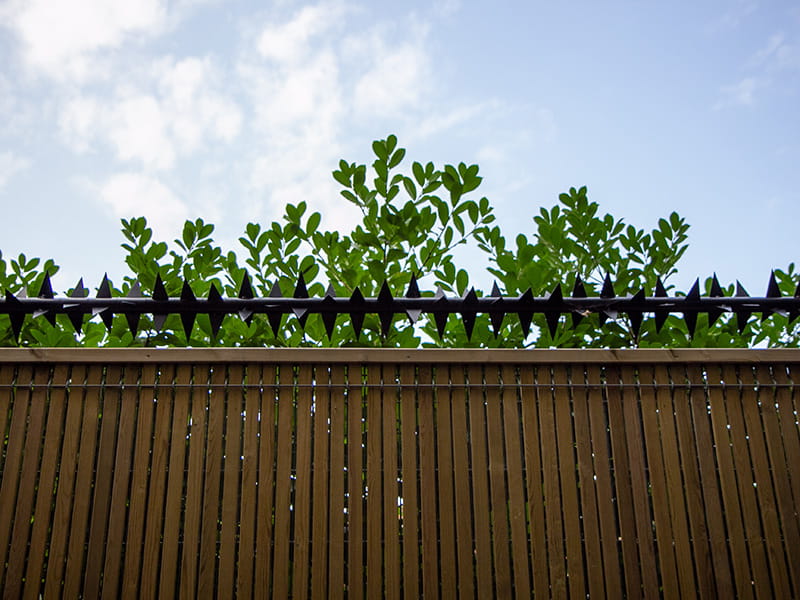
A Secure and Subtle Result
The result is a development where the fences provide peace of mind, greater privacy, and a smart finish that suits the surroundings. The secure and elegant boundary fencing has delivered not only physical protection but also a sense of reassurance for the homeowners, who can enjoy their gardens without concern for intrusion.
With a 25 year service life guarantee on both the timber and steel components, EuroGuard Combi fencing provides lasting value as well as enduring quality. For luxury properties, this project demonstrates how carefully designed garden security fencing can protect without dominating, achieving the ideal balance between strength, privacy, and elegance.
